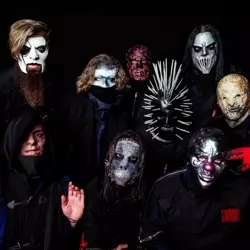 Slipknot
SlipknotWhen news broke last week that Slipknot had sold the majority of their back catalogue to the four-year-old New Jersey-based private equity investment firm HarbourView Equity Partners, there were varying opinions as to how it was valued at $120 million.
Some wondered how a band that wasn’t a household mainstream name could be worth that much.
But others approached it from a totally different perspective.
HarbourView founder and CEO Sherrese Clarke placed its value on the band’s incredible impact on music culture and fan engagement.
“Slipknot’s music has redefined heavy metal and created a global cultural phenomenon,” Clarke said. “Their catalogue is a testament to their influence, passion, and enduring artistry within the genre.”
US research company Luminate’s report Music Rights & Catalog Acquisitions pointed out that music consumption plays a “vital” role in how a catalogue is estimated.
In Slipknot’s case, it said, they reached 2.2 billion global On-Demand Audio (ODA) streams in 2024 – a 15% increase from 2023 (1.9 billion) and double that of 2020 (1.1 billion).
“Not only is that a clear sign of solid long-term growth, but since streaming payouts are based on share, we can assume Slipknot’s streaming revenue growth increased at a faster rate than the industry.
“For context, global industry revenue from streaming grew only about 7% from 2023 to 2024, per the IFPI.”
Don't miss a beat with our FREE daily newsletter
That growth has had 7 billion YouTube views to date, and has sold 30 million albums worldwide. 12 million of these were in the U.S. It showed the band’s global appeal, rather than just a market in their home country, America.
Another key factor appealing to investors and the financial market, Luminate pointed out, was that Slipknot streams are distributed across their back catalogue “rather than derived from just the top handful of hits.”
Their biggest to date is Duality, a single from 2004, which reached #1 in the UK and platinum status (and more) in Australia, Canada, the US, Denmark, New Zealand, and Portugal.
It came with a stand-out video of the band playing to 350 over-the-top fans in a rented house in Des Moines, Iowa. Slipknot remembered, “There were kids falling through ceilings, flying through glass, jumping off roofs.”
The owners sued for between $300,000 and $500,000 for repairs, but only got $50,000 from Roadrunner Records.
Two months ago, Duality hit the 1 billion streaming mark on Spotify alone. But the track only made up 10% of Slipknot’s 2024 global streams.
Heading towards the 1 billion streams mark are 2008’s Psychosocial (798 million at last count) and Before I Forget (693 million), with The Negative One, Pulse Of The Maggots, The Dying Song (Time To Sing), and Purity also streaming strongly as new fans discover them.
Similarly, another ‘90s metal phenomenon, System Of A Down, streamed 2.7 billion streams in 2024. But their top five tracks only made up 55% of the total.
Fan Loyalty
The interesting thing about the Slipknot deal is that investors are confidently banking on the rabid loyalty of their “Maggots” fans. Metal across the board has a powerful, loyal following, who hang in there for decades.
Luminate’s U.S. Artist + Genre Tracker reports metalheads listen to 60 hours a month compared to 44 hours of the general U.S. population. The research firm added, “86% of metalheads specifically listened to music from the ’90s – 18% higher than U.S. gen pop.”
Another report found that merchandising sales are huge when an act is on the road, and 80% are of black T-shirts.
Merch companies were once nervous about manufacturing metal items because of the aggression factor.
That changed after a distilling company in Des Moines was approached by the band. Its bosses were wary but were pushed into it by their younger employees, and sales of Slipknot’s No. 9 Reserve Whiskey went through the roof, helping open the international markets for metal.
The biggest music catalogue sales of all time have Queen perched at the top, with $1.27 billion.
Following are Michael Jackson ($600 million), Bruce Springsteen ($550 million), Bob Dylan ($500 million), Pink Floyd ($400 million), Phil Collins & Genesis ($300 million), Sting ($300 million), and Tina Turner ($300 million).
An acquisition deal usually includes these elements:
Publishing rights: ownership of songs transferred.
Master rights: ownership of a song’s physical and digital rights transferred.
NIL rights: selling artist allows use of their name, image and likeness.
Having these rights allows the investor access to huge project opportunities.
For instance, the Dylan and Springsteen deals were followed by Hollywood biopics.
The Dylan big screener A Complete Unknown had, by early this year, grossed $100 million worldwide, while The Boss’ Deliver Me From Nowhere, released to mixed reviews, is regarded as a relative commercial flop with a box office score of $75 million.
In general, how mainstream catalogues are valued depends on three elements.
Firstly, how much do their publishers get in royalties? Evergreen catalogues are between 10x and 15x the Net Publisher’s Share (NPS), while younger ones get 5x and 10x NPS.
Secondly, it depends on an assessment of future royalty streams.
This is, of course, unpredictable, given how artists' earnings are at the mercy of rapidly changing trends. They are usually based on data of money made in a five to seven-year period.
Thirdly, it’s the rate of return from what the buyer can expect to make from the catalogue. A 10% rate would be a $10 million catalogue making $1 million a year over ten years.
According to Billboard, which broke the story of the Slipknot deal mid-year, their catalogue generated about $15.5 million each year for the past three years. In that same period, their catalogue generated an annual $5.2 million in publishing in the same period.
In 2021, their Knotfest Roadshow was ranked #42 in gross takings with $12.3 million. In comparison, The Rolling Stones made $115.5 million that year, while the Green Day, Weezer, and Fall Out Boy package turned over $67.3 million, and Guns N’ Roses did $47.3 million.
So it remains to be seen how Slipknot’s career now rides the Up escalator.
It could mean a blockbuster biopic, or their next tours could have even more stunning production effects than they have now to sell more tickets.
As band member Shawn ‘Clown’ Crahan remarked about the deal: “After 25 years of taking on the music business, we find ourselves with a partner that is willing to sign onto continuing what Slipknot started.
“Only they want to go even bigger. Get ready. Hail The Knot.”
















